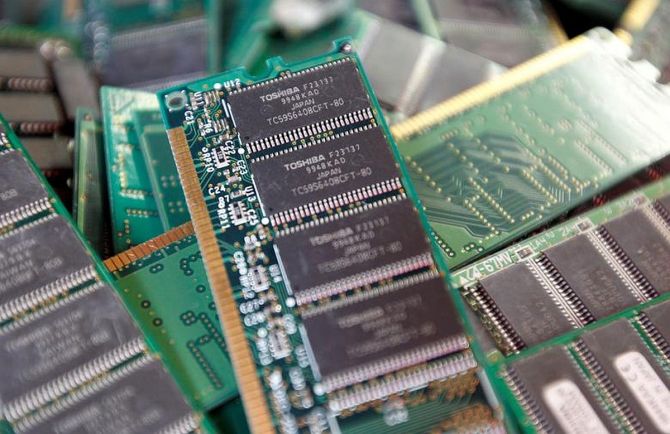Even as India’s passenger-vehicle sales touched a record high of 3.9 million units in 2022-23, growing 27 per cent over the previous financial year, the country’s largest carmaker, Maruti Suzuki India (MSIL), said on Monday uncertainties in the electronic-component supplies might affect production in FY24.

MSIL said the shortage of electronic components had some impact on production in FY23.
“The company took all possible measures to minimise the impact.
"As the supply situation of electronic components continues to be unpredictable, it might have some impact on the production volume in FY2023-24 as well,” it said in a statement to the stock exchanges.
MSIL produced 1.92 million units in FY23 (including light commercial vehicles), 16 per cent more than the 1.65 million in FY22.
Semiconductor chips have become a significant component in today’s cars.
A chip can be a simple component containing a transistor, or an integrated circuit that controls a complex system.
Popular sport utility vehicles contain hundreds of semiconductor chips in them, which explains the high waiting period for these cars, especially the higher-end ones.
A major reason behind the chip shortage, which started during the pandemic, is the dominance of Taiwan in this space.
Taiwan and South Korea make up about 80 per cent of the global foundry market. Foundries are facilities that manufacture chips.
And moreover, Taiwan Semiconductor Manufacturing Company (TSMC) enjoys a lion’s share.
China is now trying to create its own capacity. During the beginning of the pandemic, major chip-making factories in Taiwan, Japan, South Korea, and China had to stop production, leading to pent-up demand, which eventually had a cascading effect. Indian auto manufacturers import semiconductors, components, assemblies from suppliers in Germany, the US, Japan, and Taiwan.
Other major carmakers too maintain a cautious stance.
Veejay Nakra, president, automotive division, Mahindra & Mahindra (M&M), told Business Standard: “We continue to see disruptions in the supply chain of semiconductor-related parts, which have constrained production in some of our brands.
"The scenario remains dynamic and we are monitoring it closely.”
M&M has reported the highest ever annual sales of sport utility vehicles at 356,961 units, a 60 per cent year-on-year growth rate, during FY23.
In March the company said its auto sales stood at 35,976 units, the highest ever.
Growth in sales and production in FY23 had come with some easing in the chip-supply situation and pent-up demand. However, companies have turned cautious now, and the chip shortage may derail production plans for FY24.
Signs of production loss are visible.
Sample this: MSIL missed producing 51,000 units in Q1FY23, followed by 35,000 in Q2, and then 46,000 in Q3.
Assuming a loss of 40,000-45,000 in the fourth quarter, the company’s full-year loss on account of chip shortage would be around 170,000 units.
Considering it makes Rs 500,000 on average for each vehicle sold, this works out to a revenue loss of Rs 8,500 crore.
Handling the chip supply chain thus holds the key.
Tata Motors, a leading SUV player, has said it continued to be “agile” and was monitoring situation.
Shailesh Chandra, managing director, Tata Motors Passenger Vehicles and Tata Passenger Electric Mobility, said on April 1: “We continue to stay agile, carefully monitoring the supply situation, particularly semiconductors and any potential waves of Covid.”
Chandra said the growth rate of the passenger vehicle industry might moderate due to a strong base effect as well as macro factors including hardening interest rates, rising inflation, and the cost impact from progressive regulatory norms.
Similarly, a senior official of Hyundai Motor India said the company was maintaining a “cautious optimism”.
The company had registered its highest ever domestic sales of 568,000 units in 2022-23, posting an 18 per cent growth rate over the previous financial year.
The South Korean carmaker had exported 153,019 units in FY23, up from 129,260 units in 2021-22.
Therefore, after sailing high on demand and some normalisation in the availability of chips, FY24 is likely to be more challenging for automakers on several grounds.
Analysts at Motilal Oswal put it: “There has been some moderation in enquiries led by muted demand during ongoing festivals and persistent weakness in the rural market.
"Moreover, rising interest rates have further hampered bookings for low-end models.”
Passenger-vehicle production in April-February FY23 was more than 4 million units, up 27 per cent over the same period in the previous year.
With inputs from Shine Jacob











